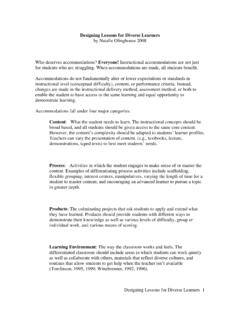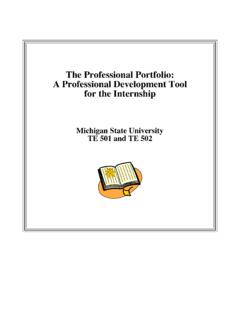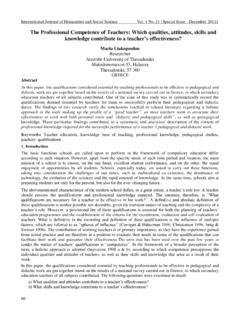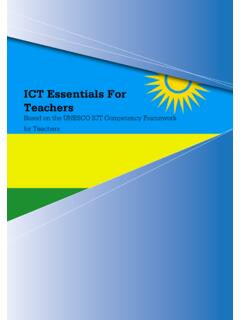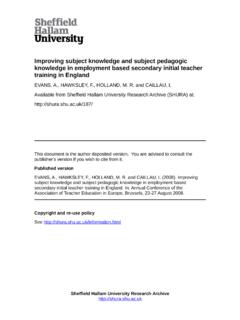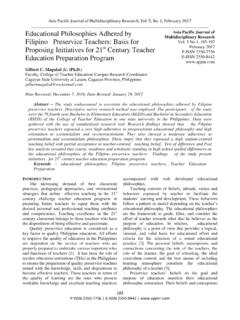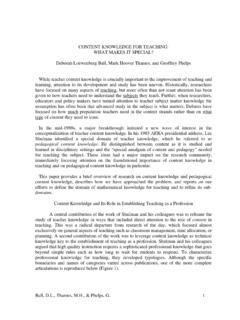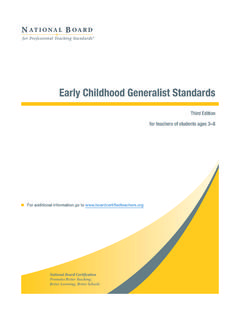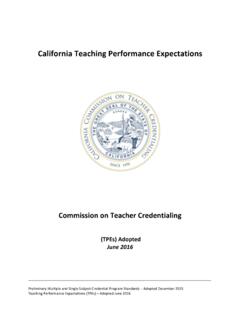Transcription of THE SUBJECT MATTER PREPARATION OF TEACHERS
1 11 THE SUBJECT MATTER PREPARATION OF TEACHERS1 Deborah Loewenberg Ball and G. Williamson McDiarmid2If anything is to be regarded as a specific PREPARATION for teaching, priority must begiven to a thorough grounding in something to teach. (Peters, 1977, p. 151).That SUBJECT MATTER is an essential component of teacher knowledge is neither a new nor acontroversial assertion. After all, if teaching entails helping others learn, then understanding whatis to be taught is a central requirement of teaching. The myriad tasks of teaching, such asselecting worthwhile learning activities, giving helpful explanations, asking productive questions,and evaluating students' learning, all depend on the teacher 's understanding of what it is thatstudents are to learn. As Buchmann (1984) points out,It would be odd to expect a teacher to plan a lesson on, for instance, writingreports in science and to evaluate related student assignments, if that teacher isignorant about writing and about science, and does not understand what studentprogress in writing science reports might mean.
2 (p. 32) Although SUBJECT MATTER knowledge is widely acknowledged as a central component of whatteachers need to know, research on teacher education has not, in the main, focused on thedevelopment of TEACHERS ' SUBJECT MATTER knowledge . Researchers specifically interested in howteachers develop and change have focused on other aspects of teaching and learning to teach: forexample, changes in TEACHERS ' role conceptions, their beliefs about their work; their knowledge ofstudents, curriculum, or of teaching strategies. Yet to ignore the development of TEACHERS ' subjectmatter knowledge seems to belie its importance in teaching and in learning to focus of this paper is the SUBJECT MATTER PREPARATION of TEACHERS : what SUBJECT matterpreparation entails, where and when it occurs, and with what outcomes.
3 Since research onteachers' learning of SUBJECT MATTER is a relatively new domain of inquiry in teacher education, theliterature is scant. The purpose of this paper, therefore, is to offer a framework that cancontribute to future research in this area. To lay a foundation for the argument, the first section of 1 This paper will appear as a chapter in W. R. Houston (Ed.), Handbook for Research on teacher Education. New York:Macmillan. 2 Deborah Ball is an assistant professor and G. W. McDiarmid an associate professor of teacher education at Michigan StateUniversity. Ball is a senior researcher and McDiarmid associate director of the National Center for Research on TeacherEducation. The authors would like to acknowledge David K. Cohen for his helpful comments and suggestions on an earlierdraft.
4 They would also like to thank Lucy Sanchez and Rose Snitgen for assistance with manuscript paper examines the concept of SUBJECT MATTER knowledge , for, although the claim that teachersmust know what they are teaching appears self-evident, agreement does not exist about what isincluded in the idea of knowing SUBJECT MATTER for teaching. The second section offers aframework for the sources and outcomes of TEACHERS ' SUBJECT MATTER learning. In the third section,this framework is used to consider extant evidence about TEACHERS ' SUBJECT MATTER PREPARATION . The paper concludes with a discussion of issues raised in earlier sections that suggest directionsfor future work on the SUBJECT MATTER PREPARATION of Role of SUBJECT MATTER knowledge in TeachingHelping students learn SUBJECT MATTER involves more than the delivery of facts andinformation.
5 The goal of teaching is to assist students in developing intellectual resources toenable them to participate in, not merely to know about, the major domains of human thought andinquiry. These include the past and its relation to the present; the natural world; the ideas, beliefs,and values of our own and other peoples; the dimensions of space and quantity; aesthetics andrepresentation; and so on. Understanding entails being able to use intellectual ideas and skills astools to gain control over everyday, real-world problems. Students should see themselves, eitheralone or in cooperation with others, as capable of figuring things out--of using mathematics todefine and reason through a problem; of tracking down the origins of current social policy; ofinterpreting a poem or story, of understanding how physical forces operate; of recreating inwriting a feeling, idea, or experience.
6 They should both be able and inclined to challenge theclaims in a politician's speech, to make sense of and criticize presentations of statisticalinformation, and to write an effective letter to the editor. A conceptual mastery of SUBJECT matterand the capacity to be critical of knowledge itself can empower students to be effective actors intheir environment. Philosophical arguments as well as common sense support the conviction that TEACHERS 'own SUBJECT MATTER knowledge influences their efforts to help students learn SUBJECT (1963) wrote that "if a teacher is largely ignorant or uniformed he can do much harm" ( ). When TEACHERS possess inaccurate information or conceive of knowledge in narrow ways,they may pass on these ideas to their students. They may fail to challenge students'misconceptions; they may use texts uncritically or may alter them inappropriately.
7 Subtly, TEACHERS ' conceptions of knowledge shape their practice--the kinds of questions they ask, the ideasthey reinforce, the sorts of tasks they assign. Although early attempts to validate these ideas, to demonstrate empirically the role ofteachers' SUBJECT MATTER knowledge , were unsuccessful ( , Begle, 1979), recent research on33teaching and on teacher knowledge is revealing ways in which TEACHERS ' understandings affect theirstudents' opportunities to learn ( , Ball, in press a; Grossman, 1988; Lampert, 1986; Leinhardtand Smith, 1985; Roth and Anderson, in press; Shroyer, 1981; Wilson, 1988; Wineburg andWilson, 1988). This research is proving fruitful, in part, because of the researchers' conceptualwork on dimensions of SUBJECT MATTER knowledge , work that is moving the field beyond thecounting of course credits as a measure of teacher knowledge .
8 Shulman's (1986) three categoriesof content knowledge -- SUBJECT MATTER content knowledge , pedagogical content knowledge , andcurricular content knowledge --are at the heart of much of the current inquiry. This paper focuseson the first, on what Shulman (1986) calls SUBJECT MATTER content knowledge . What TEACHERS need to know about the SUBJECT MATTER they teach extends beyond thespecific topics of their curriculum. Shulman (1986) argues that " TEACHERS must not only "teachersmust not only be capable of defining for students the accepted truths in a domain. They must alsobe able to explain why a particular proposition is deemed warranted, why it is worth knowing, andhow it relates to other propositions" (p. 9). This kind of understanding encompasses anunderstanding of the intellectual fabric and essence of the SUBJECT MATTER itself.
9 For example, whileEnglish TEACHERS need to know about particular authors and their works, about literary genres andstyles, they also needs to know about interpretation and criticism (Grossman, in press). A historyteacher needs detailed knowledge about events and people of the past but must also understandwhat history is: the nature of historical knowledge and what it means to find out or knowsomething about the past. Scheffler (1973) writes that this kind of SUBJECT MATTER understanding"strengthens the teacher 's powers and, in so doing, heightens the possibilities of his art" (p. 89). Lampert (in press), writing about her own teaching of fifth-grade mathematics, provides avivid picture of the role that this kind of SUBJECT MATTER knowledge plays in teaching. Shedescribes a series of lessons in which her students were learning to compare numbers written asdecimal fractions: Which is or.
10 89? Or are they equal? While part of her goal wasfor her students to develop conceptual understanding of place value with decimal numbers, shehad another aim as well: My wish [was] to present mathematics as a SUBJECT in which legitimate conclusionsare based on reasoning, rather than on acquiescing to teacherly authority.. Iwanted to enable the students themselves to question their own assertions and testtheir reasonability within a mathematical framework. (p. 24) Concretely, this means that Lampert chose not to teach her fifth graders the familiar algorithm:44"Add zeroes after the digits to the right of the decimal points until the numbers you are comparinghave the same number of decimal places. Now ignore the decimal point and see which of thenumbers is larger" (p. 4). This common approach--"line up the places and add zeroes"--is notessentially mathematical: Students arrive at an answer "through a combination of trust inauthority, memory, and mechanical skill" (p.)
